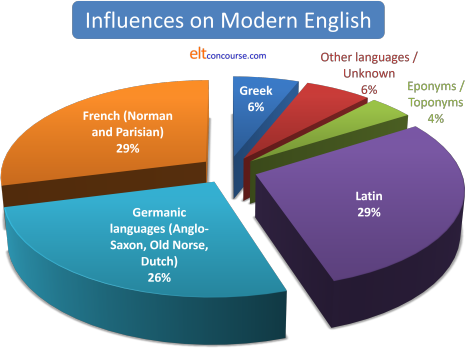My language and English
Examples in red on this page are wrong.

There are about 6500 languages in the world and they are all different.
 |
How does comparing my language with English help me to learn English? |
There are two good reasons to do this:
- If you know how your language is similar to English you can use the information to understand the grammar.
- If you know how your language is different from English you can avoid mistakes.
 |
Where does English come from? |
English is a Germanic language. Its closest relatives are
languages like German and Dutch as well as Scandinavian languages.
Most European languages are related to each other so they are
similar in some ways. The languages come from something people
spoke thousands of years ago called proto Indo-European.
 |
What type of language do you speak? |
Can you find your language on this map?

For example:
- If you come from North Africa or the Middle East, you probably speak a Semitic language like one of the varieties of Arabic or Hebrew.
- If you come from Europe, you probably speak an Indo-European language but there are some different groups of these including Slavic (Polish, Russian, Czech, Slovak etc.), Romance languages (French, Spanish, Romanian, Portuguese, Italian etc.), Germanic languages (German, Dutch, Swedish, Norwegian etc.), Albanian and Greek.
- If, however, you come from some parts of Europe, your first language may not be Indo-European so you may speak a Finno-Ugric language (Finland, Hungary and Estonia), a Semitic language (Malta) or a language such as Basque which is not a member of any family of languages.
- If you come from the East Asia, you probably speak Japanese, Korean, a Chinese language (Sino-Tibetan), Tai-Kadai, Tibeto-Burman or an Austronesian language.
 |
How do languages differ? |
These are the main ways that your language may be the same or different from English and you should know about them.
 |
The main word order |
English puts the subject first, then the verb and then the object. For example:
 |
I | like | strawberries |
| Subject | Verb | Object |
Now translate I like strawberries into your first language. What do you find? Here are the six possibilities:
| translation | order | |||
| I | strawberries | like | Subject + Object + Verb | This is a common order.
Is your language in this list? Amharic, Armenian, Azerbaijani, Basque, Bengali, Burmese, Hindi, Hungarian, Japanese, Kazakh, Korean, Kurdish, Nepali, Pashto, Persian, Punjabi, Sinhalese, Somali, Tibetan, Tamil, Telugu, Turkish, Urdu, Uzbek |
| I | like | strawberries | Subject + Verb + Object | This is another common
order. Is your language in this list? Albanian, Arabic, Bulgarian, Chinese, English, Estonian, Finnish, French, Kurdish, Greek, Hebrew, Icelandic, Italian, Javanese, Kashmiri, Khmer, Macedonian, Polish, Portuguese, Romanian, Russian, Serbo-Croatian, Spanish, Swahili, Thai, Vietnamese |
| Like | I | strawberries | Verb + Subject + Object | This is third most common order.
Is your language in this list? Arabic, Berber, Breton, Cebuano, Classical Hebrew, Hawaiian, Irish, Malagasy, Manx, Māori, Scottish Gaelic, Tagalog, Tongan, Welsh |
| Strawberries | I | like | Object + Subject + Verb | Your language does not normally do this. No languages do but some allow it in certain structures. |
| Strawberries | like | I | Object + Verb + Subject | This is very unusual but possible in some languages. It is not the usual order. |
| Like | strawberries | I | Verb + Object + Subject | This is very uncommon but some Austronesian languages do this. |
Almost certainly, your language is one of the first three.
Did you have
Strawberries, I like
them?
If you did, you probably have a topicalising language. These
languages like to put the topic (not the subject) first and then
make a sentence. English does not do this but
many Chinese languages do it a lot.
Other examples are:
John, I saw him yesterday
in English, this must be
I
saw John yesterday
John, he's coming tomorrow
in English this must be
John is coming tomorrow
etc.
Here's a list of some common languages. Is your language here?
|
Subject–Verb–Object The man took the money |
Subject–Object–Verb The man the money took |
||
|
Albanian Arabic Bulgarian Catalan Chinese languages Danish English Estonian Finnish French German (in both lists) Greek Icelandic |
Indonesian Italian Hebrew Norwegian Polish Portuguese Russian Slovak Spanish Swedish Tagalog Thai Ukrainian |
Afrikaans Armenian Basque Bengali Burmese Dutch German (in both lists) Gujarati Hungarian Japanese Kazakh Korean Kurdish |
Latin Maltese Marathi Mongolian Pashto Persian (Farsi, Dari, Tajik) Punjabi Sicilian Sinhala Somali Tajik Tamil Turkish |
 |
Adjectives and determiners |
In English, most adjectives come before the noun. We have:
the blue house
the wonderful news
the most interesting film
etc.
not
the house blue
the news wonderful
the
film most interesting
etc.
What happens in your language?
In lots of languages, e.g., French, Italian, Spanish, most
adjectives come after the noun.
In English, too, we put determiners like my, that, twelve,
those, our etc. before the noun. Other
languages do this differently.
In your language, do you say
my house
or
house my?
 |
Possessives |
English is unusual because we can say:
The government's opinion
and
The opinion of the government
In the first sentence, the possessive ('s) comes before the
noun. In the second sentence the possessive (of)
comes after the noun.
What does your language do?
 |
Prepositions or postpositions? |
In English, the preposition follows the verb and comes before the
noun (that's why we call them pre-positions).
Some languages, such as Japanese, Hindi, Finnish and Turkish, have
postpositions.
What does your language do? Do you say:
He walked over the road
or
He walked the road over
 |
Gender |
 |
| lioness and lion |
Modern English does not have male and female nouns (except for
people and animals). English sometimes makes a difference
between male and female people and jobs. So for example, we
can have
steward (male) and stewardess (female)
actor (male or female) and actress (female only)
manager (male or female) and manageress (female only)
Most of these words are no longer used so we just have actor,
manager etc.
Many languages (including yours?) have genders for all nouns so, for example, in French, the moon is female and the sun is male, in German, girl is neuter, group is female and cheese is male. In some other languages, there is a difference in gender between animate and inanimate nouns and so on.
In languages which have a gender, usually the article and the adjectives change to show if something is masculine, feminine or neuter. So, for example, in Spanish a noun, the article and the adjective will all change to show if it is masculine or feminine, singular or plural.
English does not do this at all. We never
change an adjective or an article to show gender. We have:
an unhappy man
an unhappy woman
three unhappy children
and so on.
What does your language do?
 |
Endings and other changes |
A lot of languages change the form of the verb, the noun,
adjectives, articles and so on to show changes to number and gender.
For example, in English we add -s
to show that a verb is singular and in the third person:
He arrives on
Monday but they come on Tuesday.
English also changes the end of a verb to show past tense:
He usually works in this room
but yesterday he worked
in that one.
English does not make many other changes but some languages are much
more complicated.
For example, German shows whether a noun is the object or the
subject of a verb by changes to the article and sometimes the noun
itself.
In English, articles, nouns and adjectives do not change to show
case. Pronouns do change. For more on that, see
the section on pronouns.
 |
Vocabulary |
Sometimes, words are borrowed by one language from another.
Sometimes, too, languages which are close to each other will share
many words.
English takes its words from earlier languages like this:

(Eponyms and toponyms are words named after people, businesses and
places such as hoover, wellington boots and so on.)
It's easy to see that if you speak French or a Germanic or
Latin-based language, many words will be easy to understand for you.
Be careful: sometimes the same word in English will have a different
meaning from the word in your language. For more, see the
exercises on False Friends.
 |
Pronunciation |
 |
Of course, languages are pronounced differently.
In some languages, such as French, Italian, Spanish, Cantonese and
Mandarin, every syllable takes up the same
time. So we get:
I ... went ... to ... Lon ... don ... with
... my ... bro ... ther
In other languages, such as English, Dutch, Persian languages and Scandinavian
languages, some syllables take longer to say than others. So
we get:
Iwentto ... L o n d'n ...
withmy ... b r o the(r)
Here's a list. Can you find your language here?
| LANGUAGES LIKE ENGLISH | LANGUAGES LIKE FRENCH |
| ARABIC (with
variations) CATALAN DUTCH ENGLISH GERMAN PERSIAN (FARSI / DARI / TAJIK) PORTUGUESE (EUROPEAN) RUSSIAN SCANDINAVIAN LANGUAGES |
CHINESE LANGUAGES
(also tonal) FRENCH GREEK INDIAN LANGUAGES ITALIAN JAPANESE PORTUGUESE (BRAZILIAN) SPANISH SWAHILI THAI (also tonal) TURKISH VIETNAMESE (also tonal) WEST AFRICAN LANGUAGES |
Tonal languages such as Vietnamese can change the meaning of
a word by changing the pitch of the voice. English does
not do this.
Does your language do this?
 |
What do I do with this information? |
First, make a note of how your language is different from English like this:
- What is the main word order in your language? Remember that most positive sentences in English are SUBJECT + VERB + OBJECT.
- Can your language have something
like:
That factory, that is where my father works?
Remember that English does not do this. You should say:
That factory is where my father works
or
My father works in that factory - Does your language say
a beautiful day
or
a day beautiful?
Remember that most adjectives in English come before the noun. - Does your language say
This is Mary's pencil
or
This is the pencil of Mary?
Remember that English does both but with people you should say
Mary's pencil. - Does your language say
He walked under the bridge
or
He walked the bridge under?
Remember that English uses prepositions not postpositions. Put the preposition between the verb and the noun: He is standing on the chair. - Does your language make a difference
between masculine and feminine nouns? Remember that
English does not do this for most nouns so you should not use
he or she for things. Don't say:
I have lost my pen and don't know where she is
In English, that is
I have lost my pen and don't know where it is. - Does your language change the end of
adjectives? English never does this so don't say
The greens houses
In English, that is
The green houses. - Are there lots of words in your
language that look like English words? Try these:
land
house
democracy
extraordinary
notebook
club
sensitive
Use this information but be careful to check that the meaning is the same in your language. - Listen to someone speaking in English
(try the
listening exercises on this site) and try to copy the
pattern of strong words and syllables. Don't say:
I | have | been | to | London
Try to say:
I'vebinto | LONdn.
